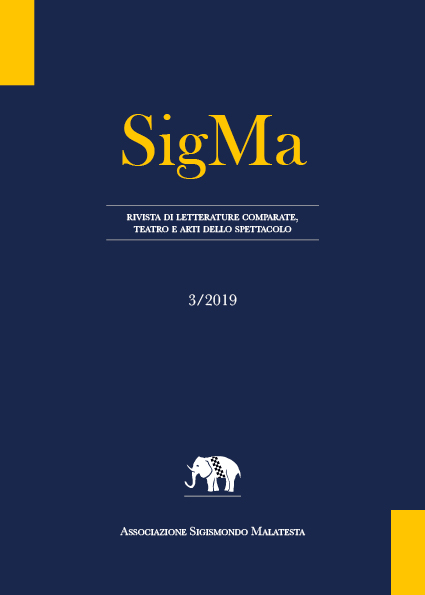Siti attraverso Pasolini: il viaggio tra fiction e non fiction
Abstract
In questo articolo si esaminano le relazioni tra le opere di due autori legati da un rapporto di corrispondenza tematica e formale esplicita: L’odore dell’India (1962) di Pier Paolo Pasolini e Il canto del diavolo (2009) di Walter Siti. Il viaggio di Pasolini è in un luogo percepito come arcaico e misterioso, miserabile e splendido; quello di Siti – che visita gli Emirati Arabi Uniti nel 2009 – è all’opposto compiuto il tempo del kitsch e dell’ipercapitalismo contemporaneo. A differenza di quella di Pasolini, la scrittura di Siti ibrida consapevolmente i generi dell’autofiction e del reportage di viaggio: mostreremo come proprio il reportage dagli Emirati lavori a mettere in crisi il confine tra fiction e non fiction, al servizio di una particolare strategia di rappresentazione della realtà.
Downloads
SigMa pubblica in internet, ad accesso aperto, con licenza:
|
|
CCPL Creative Commons Attribuzione |
L'autore conserva il copyright sul suo contributo, consentendo tuttavia a chiunque "di riprodurre, distribuire, comunicare al pubblico, esporre in pubblico, rappresentare, eseguire e recitare l'opera", purché siano correttamente citati l'autore e il titolo della rivista. L’autore, al momento della proposta di pubblicazione, è inoltre tenuto a dichiarare che il contenuto e l’organizzazione dell’opera è originale e non compromette in alcun modo i diritti di terzi, né gli obblighi connessi alla salvaguardia di diritti morali ed economici di altri autori o di altri aventi diritto, sia per testi, immagini, foto, tabelle, sia per altre parti di cui il contributo può essere composto. L’autore dichiara altresì di essere a conoscenza delle sanzioni previste dal codice penale e dalle leggi speciali per l’ipotesi di falsità in atti ed uso di atti falsi, e che pertanto Reti Medievali è esente da qualsiasi responsabilità di qualsivoglia natura, civile, amministrativa o penale, e sarà dall'autore tenuta indenne da qualsiasi richiesta o rivendicazione da parte di terzi.

